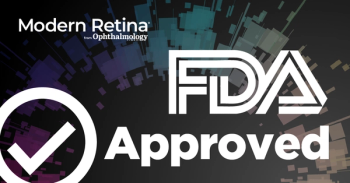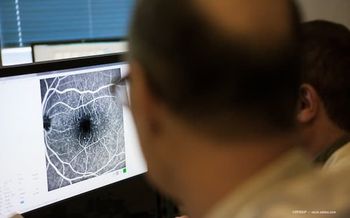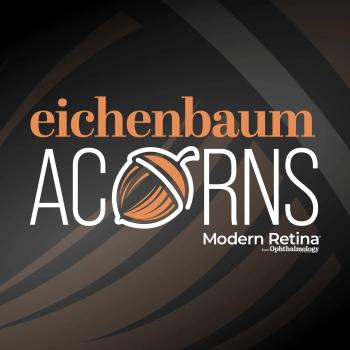
Innovent Biologics announced latest data on IBI302
The phase 2 clinical trial data evaluating the efficacy, safety, and dosing intervals of high-dose IBI302 were presented during the annual 2025 ARVO meeting.
Innovent Biologics recently announced its latest 1-year results from its phase 2 clinical trial of efdamrofusp alfa, a recombinant human vascular endothelial growth factor receptor (VEGFR)-antibody human complement receptor 1 (CR1) fusion protein.1
The phase 2 clinical trial evaluated the efficacy, safety, and dosing intervals of high-dose IBI302 (NCT05403749) in Chinese subjects with neovascular
Professor Xiaodong Sun, who is with Shanghai General Hospital affiliated to Shanghai Jiao Tong University School of Medicine, presented the results at the 2025 annual meeting of the
“It is my privilege to present the latest research findings on IBI302 to the global ophthalmic community at the ARVO meeting as the principal investigator,” Sun said in a release. “While anti-VEGF drugs remain the first-line therapy for nAMD, the frequency of intravitreal injections and follow-up visits can significantly impact patient compliance.”
The study
A total of 132 subjects were randomized 1: 1: 1 to IBI302 6.4 mg group, IBI302 8.0 mg group, or aflibercept 2.0 mg group. The primary endpoint was the change in best corrected visual acuity (BCVA) in the study eye from the baseline to week 40. The study lasted 52 weeks.
“Current drug development focuses on multi-target strategies and extended dosing intervals to reduce the treatment burden by decreasing injection frequency,” Sun said.
“Notably, IBI302 – a novel global first-in-class bispecific molecule (anti-VEGF/anti-complement) – recently reported phase 2 data showing that its high-dose cohorts met the primary endpoint. The treatment group achieved approximately 10-letters improvement in visual acuity from baseline at 1 year, with over 80% of subjects demonstrating potential for at least 12-weeks extended dosing intervals. Additionally, preliminary observations in IBI302 group suggest potential efficacy in inhibition of macular atrophy.”
Results from the phase 2 clinical study of IBI302 showed 6.4 mg/8.0 mg IBI302 competitive efficacy and safety profiles:
- A potential for extended dosing interval regiment: Over 80% of participants in IBI302 groups maintained visual benefits with a 12-week dosing interval.
- The trial met the primary endpoint of BCVA gains in 6.4 mg/8.0 mg IBI302 compared to aflibercept at week 40 with improvement sustained through week 52.
- There was anatomical efficacy improvement when compared to 2.0 mg aflibercept. At week 52, the mean change of central subfield thickness (CST) reductions from baseline was 154.58 [149.17] μm for the IBI302 6.4 mg group, 174.69 [147.04] μm for the IBI302 8.0 mg group, and 131.18 [102.91] μm reduction for the aflibercept 2.0 mg group, respectively.
- Data pooled from an analysis of two phase 2 clinical trials (CIBI302A201 and CIBI302A202) suggest that IBI302 treatment may reduce the incidence of MA at week 52 by nearly 40% compared to aflibercept (4.9% in IBI302 group vs. 8.3% in aflibercept group).
- The incidences of adverse events in IBI302 groups were similar to aflibercept. No retinal vasculitis is noted in the trial, and no new safety signals were identified.
“We anticipate this innovative therapy will successfully complete the phase 3 registration trial, providing nAMD patients with more effective, patient-friendly options,” Sun said.
Reference:
1. Innovent Biologics. Innovent Announces Oral Presentation of Full Phase 2 Clinical Data for Efdamrofusp Alfa (IBI302), First-in-class anti-VEGF/complement Bispecific Fusion Protein at ARVO 2025. Prnewswire.com. Published May 6, 2025. Accessed May 6, 2025. https://www.prnewswire.com/news-releases/innovent-announces-oral-presentation-of-full-phase-2-clinical-data-for-efdamrofusp-alfa-ibi302-first-in-class-anti-vegfcomplement-bispecific-fusion-protein-at-arvo-2025-302445964.html
Newsletter
Keep your retina practice on the forefront—subscribe for expert analysis and emerging trends in retinal disease management.




























